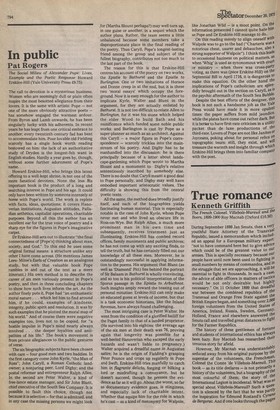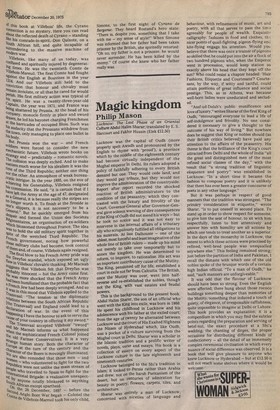True romance
Kenneth Griffith
The French Colonel. Villebois-Mareui/ and the Boers, 1899-1900 Roy Macnab (Oxford £10.50)
'During September 1899 Jan Smuts, then a vetY youthful State Attorney of the Transvaal Republic, issued a memorandum which included an appeal for a European military expert "not to have command here but to give advice which could be of the greatest value to our armies. This is specially necessary because our people have until now been used to fighting ill small numbers by means of commandos, and it' the struggle that we are approaching, it Will be essential to fight in thousands. In such a case, the advice of able officers in matters of tactics would be not only desirable but highlY, necessary." On 11 October 1899 that dreadful war between the combined republics of the Transvaal and Orange Free State against the British Empire began, and something over 2,00°, foreign volunteers from the United States or America, Ireland, Russia, Sweden, GermallY. Holland, France and elsewhere answered the Smuts call and travelled great distances to fight for the Farmer Republics.
The history of these gentlemen of fortune and students of international ethics has alWaYs been hazy. Roy Macnab has researched their tenuous story far afield.
However, Mr Macnab was understandablY seduced away from his original purpose by the superstar of the volunteers, the Frenchman, • Colonel the Comte 'de Villebois-Mareuil. This book — as its title declares — is not primarilY a history of the volunteers, but a biography of the most colourful of them; the story of the International Legion is incidental. What was so special about Villebois-Mareuil? Such a clue5. tion is silenced by the fact that he was part'Y the inspiration for Edmond Rostand's cyrao de Bergerac. And if one looks through the pages of this book at Villebois' life, the Cyrano Connection is no mystery. Here you can read about the reflected death of Cyrano — standing like his comrade-in-spirit, Don Quixote, on a South African hill, and quite incapable of surrendering to the massive machine of Modern war.
Villebois, like many of us today, was c,°nfused and spiritually injured by degenerat ing times. He was the twentieth Comte de Villebois-Mareuil. The first Comte had fought against the English at Bouvines in the year 1214. And our Villebois still held to the conviction that honour and chivalry must remain inviolate, or all that he cared for would Perish. His first military action was typical of his r, spirit. He was a twenty-three-year-old Laptain, the year was 1871, and France was being shattered by Prussia. At the head of his company, monocle firmly in place and sword drawn, he led his bayonet charging Frenchmen at the barricades of occupied Blois. Such was 1.1,1s audacity that the Prussians withdrew from tne town. his body, only managing to place one bullet in Rut Prussia won the war — and French s°1diers were forced to consider the new mechanistic future. Villebois wrote books on ,r,_strategY and — predictably — romantic novels. Ile collision was deeply etched. And to make Matters much worse for his idealism it was the tirne of the Third Republic; neither one thing nor the other. An atmosphere of weak bureaucratic intrigue. In the year 1895, on the eve of his Generalship, Villebois resigned h; e(Mirnission. He said, "it is certain that if I "ve left the Army at the age of 47, designated aS a General, it is because really the stripes are nri° longer worth it. To finish at the fireside in G-Ile's Slippers, it is not necessary to be a dcf_eral." But he quickly emerged from his pair and formed the Union des Societ6s ,..,`girnentaires, an organisation of ex-soldiers wwnich blossomed throughout France. The idea as, to hold the old military spirit together in ;Pite of the wretched Third Republic. The ti_rench government, noting how powerful ourese military clubs had become, took control thern and, of course, Villebois again resigned. %The final blow to his French Army pride was preYfus scandal, which exposed an ugly Win Villebois' chivalric thinking. Mr Macnab ,ngests that Villebois felt that Dreyfus was lie obably innocent — but the Army came first. h,,was more shocked that the French Army been humiliated than the probable fact that itrrench Jew had been deeply wronged. And so 7,c'ves in this mood that Villebois applied to the rerlsvaal: "The tension in the diplomatic rthatiQns between the South African Republic u _yte Transvaal] and England could lead to a heaclaration of war. In the event of this e,1313ening I have the honour to ask to serve the of your country in offering it my sword." aZe Transvaal accepted Villebois' "sword" WIT* Macnab informs us what happened t.!en the sophisticated French Colonel joined str'e old Farmer Conservatives. It is a very Euange human story. Both the character of chr°Pe at the turn of the century and the We acter of the Boers is movingly illuminated. wo,,are also reminded that those men — and Iken'"ehn — who volunteered to fight for the two Deoc,ti,ulics were not unlike the main stream of to,.,re who travelled to Spain to fight for the 4crnational Brigade: a realisation unexpected by a Soot, nyone totally blMkered to anything Li `-'African except apartheid. seen the 28 December, 1897 — before the cound Anglo Boer War began — Colonel the rnte de Villebois-Mareuil took his only child,
Simone, to the first night of Cyrano de Bergerac. They heard Rostand's hero state: "There is, despite you, something that I take with me — my sense of style!" When Simone was informed that her father had been taken prisoner by the British, she spiritedly retorted: "Oh no, my father is not a prisoner, he would never surrender. He has been killed by the enemy." Of course she knew who her father really was.



































 Previous page
Previous page